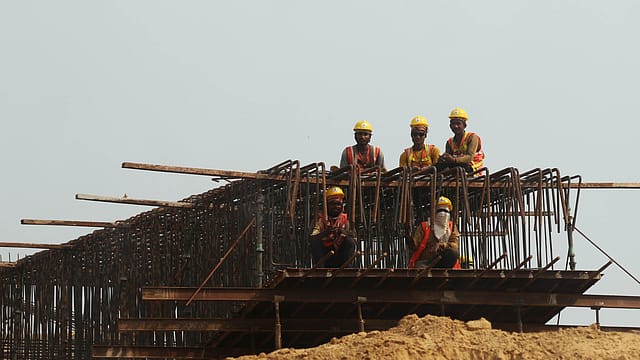Budget 2024: Roadmap for sustainable growth
ADVERTISEMENT

In line with the vision of Viksit Bharat, the Union Budget 2024-25 lays the foundation for sustainable growth, economic development and all-round prosperity by focussing on employment, skilling, MSMEs, and the middle class. In addition, the continued focus on maintaining capital expenditure, creation of fiscal space for boosting education, employment, and skill development and initiatives to accelerate energy transition, the budget envisages an era of inclusive growth, touching all sections of the society. The logistics industry is going through a transformative phase with the launch of National Logistics Policy and PM Gati Shakti National Master Plan as well as growing adoption of digital technologies to build efficiency and focus on environmental sustainability. The budget proposals create an enabling ecosystem for the logistics industry to achieve these goals and become future-ready.
Building Human Capital
One of the standout initiatives is the ambitious plan to skill 20 lakh youth over a five-year period. This program aims to equip young Indians with the necessary skills to thrive in an ever-evolving job market. The initiative includes the upgrading of 1,000 Industrial Training Institutes (ITIs) in a hub-and-spoke arrangement, ensuring an outcome-oriented approach. By aligning course content and design with the skill needs of the industry, the government is taking concrete steps to bridge the gap between education and employment. This alignment is crucial for creating a workforce that is both competent and adaptable to the emerging demands of industries.
In addition to skilling programs, the budget introduces a scheme for providing internship opportunities in 500 top companies to 1 crore youth over five years. Each intern will receive an allowance of ₹5,000 per month, along with a one-time assistance of ₹6,000 through CSR funds. This initiative not only offers financial support but also provides practical experience, making youth more employable and ready for the workforce.
January 2026
Netflix, which has been in India for a decade, has successfully struck a balance between high-class premium content and pricing that attracts a range of customers. Find out how the U.S. streaming giant evolved in India, plus an exclusive interview with CEO Ted Sarandos. Also read about the Best Investments for 2026, and how rising growth and easing inflation will come in handy for finance minister Nirmala Sitharaman as she prepares Budget 2026.
Envisioning Inclusive Growth
The budget allocates more than ₹3 lakh crore for schemes benefiting women and girls. This significant investment underscores the government's dedication to gender equality and women's empowerment. By providing resources and opportunities tailored to the needs of women and girls, these schemes aim to create an inclusive environment where all members of society can contribute to and benefit from economic growth.
Boosting MSMEs And Manufacturing, The Key Growth Engines
The Credit Guarantee Scheme for MSMEs in the manufacturing sector is another critical component of the budget. This scheme aims to provide financial support to small and medium-sized enterprises, enabling them to expand and innovate. By offering credit guarantees, the government reduces the financial risks faced by these enterprises, encouraging entrepreneurship and industrial growth.
Furthermore, the sanctioning of twelve industrial parks under the National Industrial Corridor Development Programme is set to enhance India's manufacturing capabilities. These parks will provide state-of-the-art infrastructure and facilities, attracting domestic and international investments. This initiative aligns with the government's vision of making India a global manufacturing hub.
Maintaining Capital Expenditure In Infrastructure Development
The budget maintains a strong focus on infrastructure development, with a capital expenditure target of ₹11.11 lakh crore, constituting 3.4 percent of the GDP. This substantial investment in infrastructure is expected to have a growth-multiplying impact on the economy by strengthening operational efficiency and transportation bandwidth. The allocation of ₹1.5 lakh crore for long-term interest-free loans to states for infrastructure development in FY25 promotes a collaborative development narrative, encouraging states to actively participate in national growth.
The launch of Phase 4 of the PM Gram Sadak Yojana, which aims to construct all-weather roads connecting 25,000 rural habitats, is another significant initiative. This will not only boost the distribution capability of industries but also create new demand and consumption centres in rural areas, driving economic activity and development.
Driving Innovation, Research & Development
The budget also emphasises the importance of innovation and research. A private sector-driven research and innovation initiative with a financing pool of ₹1 lakh crore is set to propel India to the forefront of technological advancement. This initiative aims to foster a culture of innovation, encouraging the private sector to invest in cutting-edge research and development at a commercial scale.
Fuelling Growth Through FDI And Overseas Investments
To facilitate Foreign Direct Investments (FDI) and promote opportunities for using the Indian Rupee as a currency for overseas investments, the government has simplified regulations. This move is expected to attract more international investments, bolstering India's economic stature on the global stage.
Strengthening Data Governance
The improvement of data governance, including better collection and processing of data, is also highlighted in the budget. Effective data governance is crucial for informed decision-making and efficient implementation of policies. By enhancing data management capabilities, the government aims to create a more transparent and accountable system.
Roadmap For Sustainable Growth
In conclusion, the 2024 budget outlines a comprehensive and forward-looking approach to economic development while maintaining a fiscal discipline. It’s a blueprint for the emergence of India as the global economic powerhouse. And, in that process, the budget has empowered the logistics industry to play the role of a key growth enabler.
Shashi Kiran Shetty is the founder and chairman of Allcargo Group
